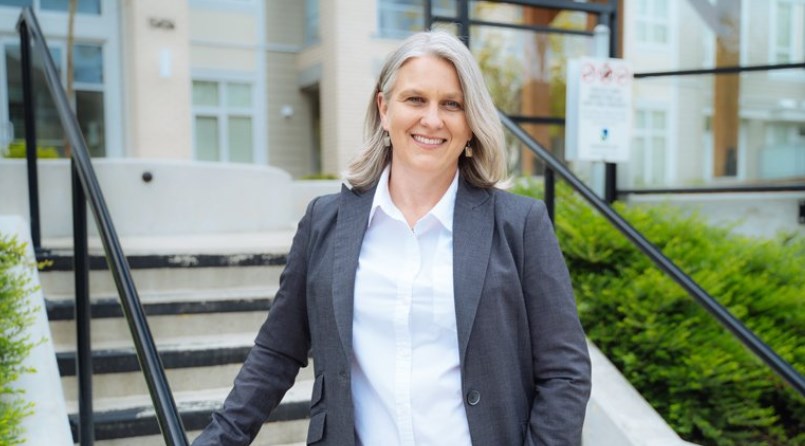When BC United MLA Elenore Sturko raised concerns last week about government money being used to buy illegal drugs from organized criminals, Solicitor General Mike Farnworth deflected and said if she had a problem with it she should take the matter up with police.
So she did.
Sturko met on the weekend with Vancouver police detectives to turn over what she says is credible evidence of alleged criminal wrongdoing.
The exact nature of the evidence Sturko wants to keep confidential, for now.
But she said it builds off her public comments in and outside of the legislature that civil servants, health officials, universities, and publicly-funded service groups were involved in allowing taxpayer money to go to organized crime for illicit drugs like cocaine, heroin and meth, which were then tested (also using public money) and given out to those with addictions in Vancouver through an unsanctioned compassion club.
“I handed in my badge but I didn’t hand in my integrity, that’s something you don’t give up when you change careers,” said Sturko, a former RCMP officer and now the MLA for Surrey South and BC United mental health and addictions critic.
“So for me, I would not feel right or sleep well having this information and not forwarding it to police.”
The BC NDP government is trying to have it both ways in condemning the Vancouver Drug User Liberation Front (DULF) for buying drugs on the dark web to create an illegal dispensary for its users, but not bothering to investigate how much of the almost $430,000 in public health funding the organization received the last two years went to organization criminal agencies for the drugs, and the extent to which it was known and condoned by not only the Vancouver Coastal Health authority but provincial officials in the ministries of health and addictions, said Sturko.
“There’s a lot to be looked at,” she said.
DULF was raised by Vancouver police last month. Two people were arrested. Premier David Eby said DULF had engaged in illegal and unacceptable activities, and instructed Vancouver Coastal Health to terminate its contract for drug testing and overdose prevention services.
Yet the NDP government apparently has little interest in finding out if anyone knew about those illegal activities inside the government, if they were sanctioned, if anyone turned a blind eye and how much public money did allegedly flow to the dark web and straight into the hands of criminals, said Sturko.
In the legislature last week, Farnworth said DULF was funded to help facilitate drug testing, to ensure people using drugs during the ongoing overdose crisis could operate safely.
“The ministry and the minister became aware that that contract was not being followed, and it was immediately terminated,” he said.
“It was the expectation that everybody follow the law. The member knows, and I will say this, that I do not direct investigations. If she has evidence, then she should take that to the police.”
Also tied up in Sturko’s police complaint is the University of Victoria, which tested DULF’s illegally-purchased drugs, and the BC Centre for Substance Use, which surveyed DULF’s members and, according to Sturko, publicly-condoned and promoted DULF’s activities.
UVIC and the substance use centre receive public funds. The BC Centre for Substance Use also advises the province on drug policies.
“I see indications that unlawful activity has taken place in the public service and it's my duty as both a member of the opposition and responsible person to report that information forward,” said Sturko.
UVIC has said whatever it did or didn’t do with DULF is confidential. That’s another reason to involve police, said Sturko, because the university cannot hide behind its self-imposed confidentiality provisions when law enforcement is involved.
“Their confidentiality agreements do not protect them from investigation,” she said.
“There’s so much interconnectedness of this situation, linkages of what’s taken place, government funding, who is funding the testing lab, who would have knowledge, what processes exist for ethics reviews at universities, who would have to have knowledge and what processes would be disclosed.”
DULF has not exactly kept its activities secret. It has promoted its activities in media interviews for years, including the grey area between publicly-funded drug testing and illegally-sourced drug purchases.
“I can’t see how you can find this blatant disregard for the law and have no concern about whether there was criminal activity in the public service,” said Sturko.
“I’ve given this government opportunities to do the right thing, and outside of a criminal investigation even offered that they be willing to do their own internal investigation, to find out how this happened and when people became aware of it. But they say no, they don’t want to do that.”
Neither the province, nor Vancouver Coastal Health, has announced any sort of internal probe into the DULF situation, despite the public condemnation from Eby and Farnworth. The only one looking for answers, at this point, appears to be Sturko and the police.
Rob Shaw has spent more than 15 years covering B.C. politics, now reporting for CHEK News and writing for Glacier Media. He is the co-author of the national bestselling book A Matter of Confidence, host of the weekly podcast Political Capital, and a regular guest on CBC Radio. [email protected]





